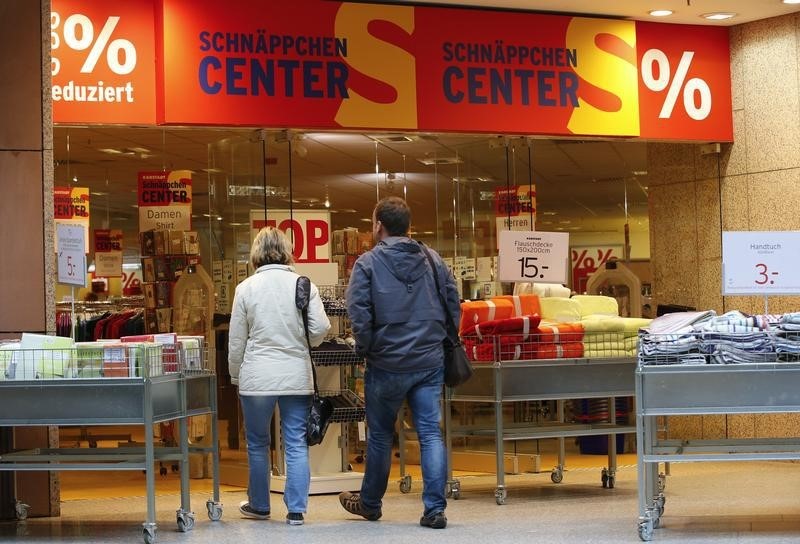By Michael Nienaber and Francesco Canepa
BERLIN/FRANKFURT (Reuters) - German unions have reached an inflation-busting pay hike deal for more than 2 million public sector workers that could push up prices and boost a consumer-led upswing in Europe's biggest economy.
The deal sealed late on Tuesday night is part of a broader, gradual shift in Germany's economy in which private consumption has overtaken exports as the main growth driver, making the recovery more resilient to external shocks.
The complex wage agreement gives public sector workers a 3.2 percent pay raise backdated to March 1, followed by a 3.1 percent increase from April 2019. In a third stage, wages will rise by a further 1 percent from March 2020.
With inflation projected to stay well below 2 percent this year and next, the agreement also means in real terms that workers have more money to splash out.
"It is the best result in many years," Verdi union chief Frank Bsirske told reporters in the town of Potsdam near Berlin.
It comes in the wake of an unusually high pay hike reached in February for 3.9 million workers in the industrial sector that amounted to a roughly 4 percent annual rise for 2018 and 2019.
Record-low unemployment and unprecedented shortages of skilled labour in many sectors have led German employers to give up years of wage restraint.
"The time of ultra-low wage settlements is clearly behind us. Above all, this reflects how Germany is slowly reaching full employment," Commerzbank (DE:CBKG) economist Joerg Kraemer said.
The European Central Bank is keeping a close eye on German wage negotiations for any sign that wage growth is picking up, potentially helping lift inflation and giving the euro zone's central bank added leeway to start winding down its massive stimulus programme.
Salary growth has been missing despite a brisk expansion in the euro zone economy over the past year, largely fuelled by the central bank's easy money and by a booming global economy.
The German wage deal is likely to bolster the ECB's confidence that salaries in the bloc's largest economy are finally picking up, paving the ground for a long-awaited recovery in inflation.
This would strengthen the ECB's hand as it prepares to close the money taps after three years of aggressive stimulus.
"This is good for Germany and the euro zone and obviously reduces the headache in the towers of the ECB in Frankfurt," said Florian Hense, an economist at Berenberg Bank.
Inflation across the euro zone has stabilised comfortably above 1 percent in recent months, allowing the ECB to gradually reduce the amount of stimulus it provides to the economy as it seeks to lift price growth to its target of just under 2 percent.
It is now widely forecast to wind down its 2.55 trillion euro bond-buying programme by the end of the year and raise interest rates towards the middle of 2019 for the first time in eight years.
BILLIONS OF EUROS
German Interior Minister Horst Seehofer, who led the negotiations for employers for the first time, said the deal would cost the federal government some 2.2 billion euros ($2.7 billion) per year, while making public service a more attractive job option.
"I'm satisfied. The public finances will not be overstretched," Seehofer said.
The Verdi trade union and the dbb association of civil servants had initially sought a pay rise of 6 percent for one year, or at least 200 euros more a month, but said they were pleased with the agreement that emerged.
Negotiators for the unions and employers struck the deal late on Tuesday during a third round of talks that began on Sunday, after walkouts by more than 150,000 union members last week.
The walkouts by tens of thousands of ground staff and other public sector workers led to hundreds of flights being cancelled, and strike action also hit nurseries and rubbish collection in some cities.
Failure to reach an agreement would have sparked more widespread strikes, potentially hurting growth after weak economic data already pointed to a muted start to the year.
Consumers have led the rebound in the German economy, helped by low borrowing costs and falling unemployment, which in turn has helped the government record buoyant tax revenues and a record state budget surplus.
The International Monetary Fund on Tuesday raised its growth forecast for Germany to 2.5 percent this year. The government, which in January projected 2.4 percent gross domestic product growth, will update its own estimate next week.
In 2017, German consumers increased their spending by 3.6 percent, the largest rise in more than 20 years.
Household spending contributed 1.1 percentage points to an overall expansion rate of 2.2 percent last year, while net foreign trade added only 0.2 percentage points.
($1 = 0.8091 euros)
